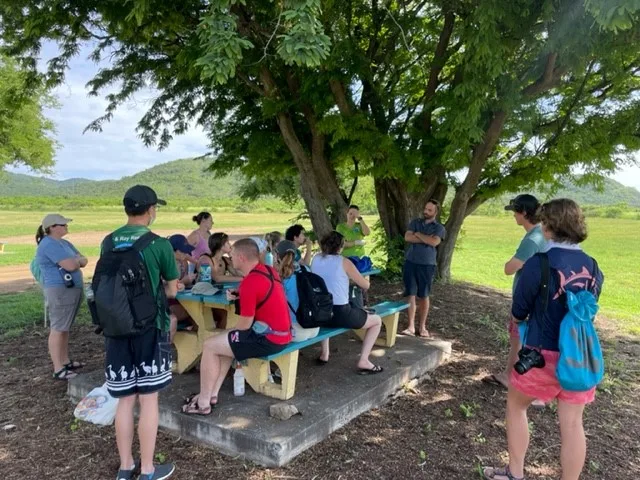News
A Trip East and a Snorkel

Tanya van Renesse
https://sea.edu/wp-content/uploads/2022/09/s.jpg
Many of you have been following Corwith Cramer as it races to St. Croix. You may or may not be aware that there is an eager crew shoreside awaiting its arrival. The nine students of the Caribbean Reef Expedition along with two scientists, a captain, reefhand, and four deckhands (of which I am one) have been stationed at the unbelievably beautiful Feather Leaf Inn doing educational field trips, exercises, and lectures in preparation of spending several weeks aboard the cramer beginning later this month.
The crew gathered this morning at 0800 for an unusual, though oddly satisfying breakfast of quinoa/chia porridge topped with fresh local fruit, nuts, and homemade jam and nut butter. After breakfast, all seventeen in our group crammed into two rental vehicles and shook around in dramatic potholes (courtesy of Hurricane Irma) as they made their way to the St. Croix East End Marine Park.
We toured the small visitor center at the park, which was extremely well put together. Each exhibit was interactive. My personal favorite was a magnetic “fishing” station designed to educate us on the types of fish appropriate to catch, and those which should be released for conservation purposes. I was unprecedentedly bad at this.

After the visitor center, the group met outside to speak with Caroline Pott and Matthew Warham from the marine park about the work they do and some of the conservation challenges in the area. In his talk, Mark mentioned he was concerned about valuable data not being disseminated effectively, and thus not being utilized in creating policies and habits that could preserve the marine environment. He was very interested in the datasets being collected by students of SEA and is in discussion with our Chief Scientist Heather Page about using these to further his conservation goals on the reefs.
We ate lunch, took a quick swim, then squeezed back into our cars to head back to the Inn. There, we gathered our snorkel gear and trudged through tall grass down the hill to Butler Bay to do a practice snorkel for our first survey tomorrow morning. The students and deckhands worked on their sample collection, benthic photography, fish IDs and invertebrate IDs. They also practiced safe snorkel habits, such as a buddy system, duck diving, noticing and avoiding potential hazards, and clearing their masks and snorkels.
We entered with low expectations for marine life, but during the snorkel students found a Smooth Trunkfish, Sand Diver Fish, Diadema, among other things.
I am now sitting on our balcony ledge, sleepy and satisfied from dinner, noticing my legs slowly get more and more sore from using my flippers. A couple lingering students are chatting in the adjoining room as they finish getting their dive slates and sampling tools together for our survey tomorrow. I’m sure we will all sleep very well tonight.